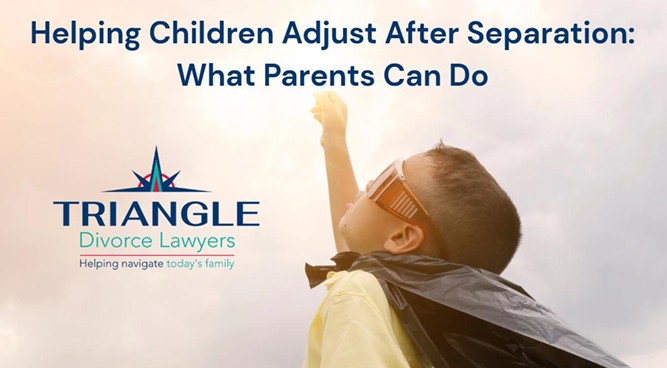Separation and divorce are life-changing—not just for you, but for your children as well. While adults may understand the reasons behind the change, kids are often left feeling confused, anxious, or even responsible.
At Triangle Divorce Lawyers, we’ve seen how vital it is for children to feel secure, supported, and loved during this transition. The good news? With the right approach, children can adapt—and even thrive—after a separation.
Here are five ways you can support your child’s emotional well-being and ease the transition.
1. Communicate Honestly—In an Age-Appropriate Way
Children don’t need every detail of the separation, but they do need clarity and reassurance. If possible, sit down together and explain what’s happening in simple, comforting language:
- “We’ve decided not to live together anymore, but we both still love you.”
- “This is not your fault.”
- “You will still see both of us.”
Avoid blaming or emotionally charged language, and never place your child in the middle of adult conflict.
2. Maintain Consistent Routines
Structure is reassuring. Try to keep daily routines—like bedtime, school drop-offs, and weekend plans—as consistent as possible, even across two households. Familiar patterns can help children feel grounded and reduce stress during uncertain times.
3. Foster a Cooperative Co-Parenting Relationship
Children benefit from seeing their parents work together, even if the relationship has changed. Strive for respectful communication, and keep discussions about legal matters or disagreements out of earshot.
If direct communication is difficult, consider using co-parenting apps or shared calendars to manage schedules and reduce conflict.
4. Pay Attention to Emotional and Behavioral Changes
It’s normal for kids to feel sadness, anger, or confusion after a separation. But if you notice signs like withdrawal, academic struggles, or behavioral shifts, it may be time to seek professional support.
A counselor who understands divorce-related issues can help children process their emotions in a healthy way. Early support often leads to better long-term outcomes.
5. Use Resources That Support Your Child’s Emotional Growth
Books can be a powerful tool for helping children (and parents) express what they’re feeling. That’s why we’ve curated a list of recommended titles for families navigating separation.
Explore our recommended reading list here
These books can open up meaningful conversations, offer comfort, and support children of all ages through the transition.
We’re Here for You—and Your Family
Divorce is more than a legal matter—it’s deeply personal, especially when children are involved. At Triangle Divorce Lawyers, we help families approach custody and co-parenting plans with clarity, compassion, and confidence.
Need help with a parenting plan or custody agreement?
Call us at 919-303-2020
Or visit https://triangledivorcelawyers.com/contact/ to schedule a confidential meeting.
Let’s help your family move forward with strength and stability—together.





